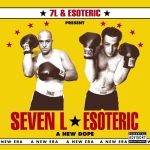|
|
 |
Dusted Reviews
Artist: 7L & Esoteric Album: The New Dope Label: Babygrande Review date: Aug. 6, 2006 |

|
|
|
 |
The Boston DJ and MC team 7L & Esoteric have been producing hip hop records for nearly ten years, a run which, in terms of time, has eclipsed the more storied and influential collaborations of Eric B & Rakim, Pete Rock & CL Smooth, and EPMD. Unlike the oeuvres of those latter three groups, however, 7L & Esoteric’s body of work has been consistently above average, but never outstanding. The New Dope is no different, another chapter in a career well in need of a climax.
Esoteric, the rapping half of the duo, is a clever writer, whose wealth of Nor’easter pop references rivals that of sportswriter Bill Simmons. “Reggie Lewis is Watching,” a memoir of events concurrent with the titular subject’s run as a Boston Celtic, feels like a Sports Guy column put to a beat – which, depending on your opinion about smarmy, pseudo intellectual humor, may or may not be a good thing. The song elicits a chuckle, but it is also a thoroughly banal recounting. “Reggie Lewis is Watching,” like most of The New Dope, hugs the edge of triteness closely, making uncomfortable any listener who might resist the New York Times’ obsequious gestures to Simmons and Chuck Klosterman, those scions of fratboy criticism.
Setting aside grievances with the state of lay letters and, instead, turning to a more likeable element of mainstream American culture: Esoteric has a voice which calls to mind the plump, oleaginous tone of Jay-Z. Although their vocals may be somewhat similar, they use their voices in different and deliberate fashions. Two years ago, Jay-Z renounced the expectations of underground hip hop on The Black Album, stating in no uncertain terms that, “Hustlers and bruisers embrace me for the music I be making / I dumbed down for my audience to double my dollars / They criticize me more but they all yell ‘holla.’” Although the public may have disproportionately eulogized Jay-Z’s output on the eve of his retirement – really, he put out three great albums on the bookends of his career, with a lot of drivel in between – much of The New Dope is representative of why Jay-Z abandoned the verbose approach of his first record.
Esoteric is a wordsmith, unquestionably, a flexible performer who is always comfortable, regardless of the speed or syncopation of the backbeat. Despite his malleable cadence, however, he seems incapable of being anything more than an underground battle rapper, routinely witty but rarely provocative. He is Promethean in style: interminably bound to push the boulder of his DJ’s productions with tireless and tiresome sarcasm. Other rappers, like Jay-Z, began their careers as wordy microphone controllers and, eventually, realized that the conventions of the underground could be just as cramping as those aesthetic demands of popular radio. Not all succeeded, necessarily, and many, like Jay-Z, adopted their new approaches as a hustle, a less than noble motivation. But these artists at least offered a change between albums, something new that listeners could debate the merits of. This change is absent here. Refusing to grow, Esoteric’s efforts on The New Dope feel quite old.
The saving grace of this pair is 7L's production. He serves up beats that sound more demented than in past outings. The screwball quality of his tracks would be better suited for another rapper with a greater flare for comedy or, at the very least, for the surreal. If there is one song on The New Dope where Esoteric meets his producer’s call, however, it is “A.O.S.O.” a dopey narrative about a rapper asking Esoteric for assistance on a track only to stand him up. As the story goes, the antagonist begins as an unknown seeking Esoteric’s help and, three verses later, has eclipsed Esoteric in popularity, touring with 50 Cent and partying with assorted pinup girls. At the song’s climax, Esoteric perfectly captures the mood of 7L’s beat, a droning organ coupled with a slaphappy drum sequence, by ceasing to rap and, instead, adopting that most postmodern of devices, the list. Reciting the names of the various people whose faces appear on t-shirts – and, intermittently, asking why his name is not included – Esoteric is both frustrated with his own lack of popularity but also making a comment about the ridiculousness of our commodity culture.
The song’s juncture of silliness and sociological statement is a brave twist on the 7L & Esoteric standard, reminiscent more of David Byrne than of Kool Keith. If only the duo had attempted this more. Then, the album might be deserving of its grandiose title.
By Ben Yaster
|







